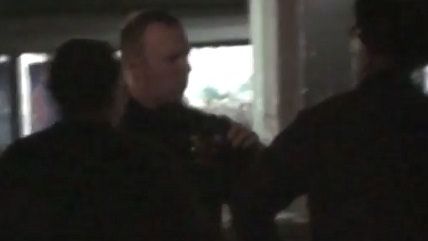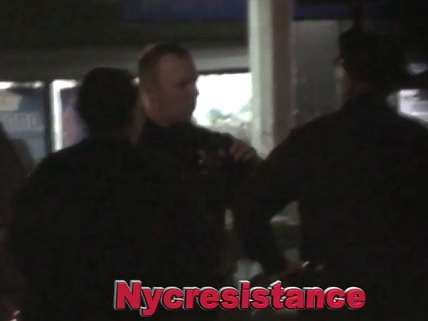NYPD Cop's Threat to Resident Filming Him: Don't Make Me Fear for My Safety


No matter how often it's brought up, it can't be stressed enough how toxic police unions are to the arduous task of rooting out misconduct in any given police department.
The New York Police Department (NYPD) probably hasn't seen this much sustained critical press since Giuliani was in charge in the 1990s—though the relative absence of coverage of the Akai Gurley shooting shows just how lacking "sustained" coverage can be. Gurley's killer, for example, contacted his union rep before bothering to call for medical assistance but this horrific detail is nary mentioned in the press or by your garden variety liberal protesters who have so attached themselves to the issue of police violence in the last few months.
Some of the leadership at the NYPD understand that they need to at least make an effort at improving their image. The chair of the NYPD's civilian review board, for example, wants cops to avoid foul language. He's not going to like the latest video from M. Logic, a New York City resident who films cops, as is his right and a service to all New Yorkers. Logic was documenting two cops who were patrolling the Bronx on foot to hand out parking tickets and decided to talk to some of the police's sources of revenue that night.
Watch below, the video is queued to the start of the incident:
It ought to be unbelievable that a cop in New York City, with anti-police violence protests ongoing, would have no problem making an implicit threat to shoot someone on camera. Given the very generous job protections offered cops by their contracts, this kind of behavior isn't surprising. There's literally no substantive consequences for it, caught on camera or not.
Some people say that the anti-police violence protests across the country "look like what history looks like." I like to consider myself an optimist but I just see a lot of posturing, signaling and agenda-hijacking, demands for the conversation to be about race to the exclusion of everything else. The protests may be useful for the protesters' sense of self-worth of duty but they're not doing anything to stop the system from producing bodies and not much in the way of slowing that system down either.
Body cams and more independent investigations are important components to reducing police violence. But without a disciplinary regime that offers serious consequences for all misconduct (a broken windows approach to policing the police, so to speak), and police unions thwart just those kinds of regimes from being imposed, other solutions are largely reactive and not actually preventative.
Hopefully I'm wrong. At the moment, New York's Gov. Andrew Cuomo (D) is deciding whether to sign a bill that hands more of the power to discipline cops to police union, a bill that passed overwhelmingly in the Democrat-controlled state legislature. Cuomo's ultimate decision (don't hold your breath and him making the right one) will be a good indicator of the shape of police reform efforts to come.
Show Comments (98)